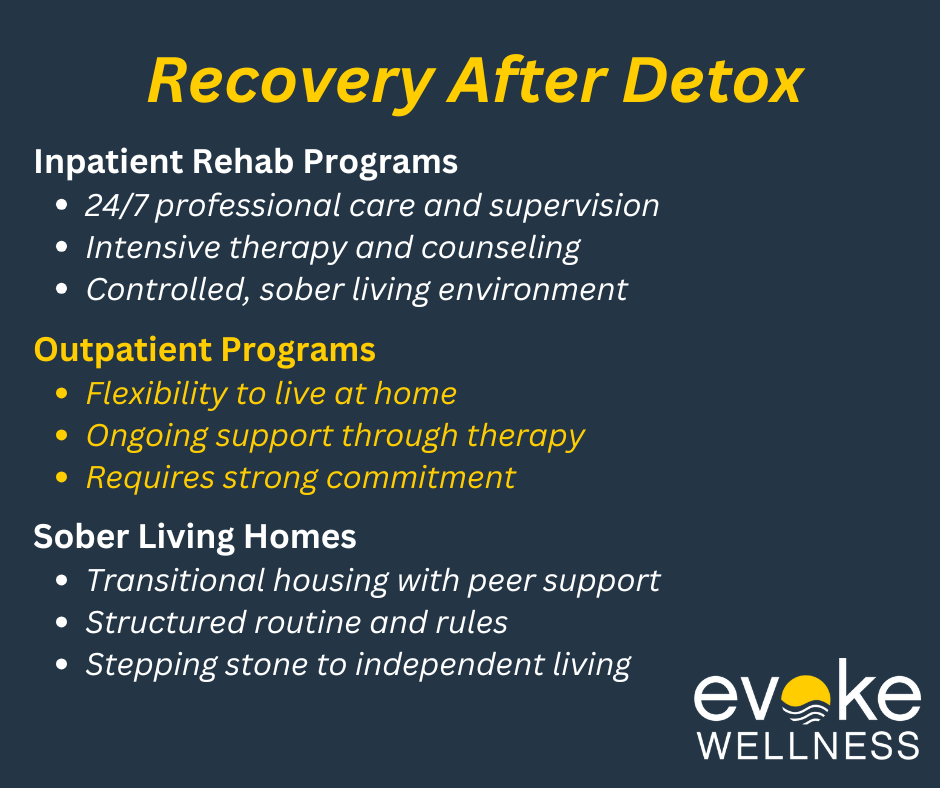Congratulations on completing medical detox – you’ve taken a crucial first step toward recovery. But now what? As you emerge from the fog of withdrawal, you may feel uncertain about your next move. The journey ahead can seem daunting, but you have options. This article will explore the various paths available to you after detox, helping you make an informed decision about your ongoing treatment and support. From intensive inpatient programs to flexible outpatient care, we’ll break down the pros and cons of each approach. Your post-detox journey is unique, and finding the right fit is key to long-term success. Let’s dive in and discover what comes next on your road to lasting recovery.
Call us at (866)429-2960 today or reach out online.
What Is Medical Detox?
Medical detox is a crucial first step for overcoming addiction. It involves carefully managing withdrawal symptoms as substances leave your system.
Safe, Supervised Environment
- 24/7 medical monitoring and support
- Medication to ease discomfort
- Holistic therapies like yoga and meditation
Prepares Mind and Body
Getting clean prepares you for deeper addiction treatment. Once stabilized, you’ll have a clear mindset to address root issues.
When Is Medical Detox Necessary?
Medical detox is recommended when quitting drugs or alcohol poses serious health risks. It provides 24/7 monitoring to manage potentially dangerous withdrawal symptoms.
Substance Abuse History
- Long history of heavy, chronic substance use
- Previous unsuccessful attempts to quit “cold turkey”
- Severe withdrawal symptoms in the past
Physical Dependence
- Alcohol, opioids, benzodiazepines, and other sedatives
- Sudden cessation could trigger seizures, delirium tremens, organ failure
Mental Health Concerns
- Co-occurring disorders like depression or anxiety
- Detox under medical supervision reduces relapse risks
The safest approach is to consult an addiction specialist. They can evaluate your unique situation and determine if medical detox is warranted.
What to Expect During Medical Detox
During medical detox, you’ll be closely monitored by professionals. Expect medication to help ease withdrawal symptoms and cravings.
Supervised Care
- 24/7 medical staff oversight
- Safe, comfortable environment
Withdrawal Management
- Medications to reduce discomfort
- Emotional support from counselors
Transition Planning
- Customized aftercare recommendations
- Exploration of treatment options
The detox process allows your body to eliminate substances safely. With proper care and planning, you’ll be better prepared for the next phase of recovery.
Medications Used During Detox
Medications help manage withdrawal symptoms during detox. Common examples include:
- Benzodiazepines to reduce anxiety, seizures
- Clonidine for opioid/alcohol withdrawal symptoms
- Anti-nausea/anti-diarrheal medications
Dosing is carefully monitored. Medications make detox safer, more comfortable.
How Long Does Detox Take?
The duration of detox varies based on several factors. A few key points:
- Substances involved – More potent drugs like heroin may require 5-7 days. Alcoholics often need 7-10 days.
- Method of use – Intravenous drug use tends to create stronger dependencies requiring longer detox periods.
- Overall health – Those with co-occurring mental or physical conditions may need more time to stabilize.
Most medical detox programs last 5-14 days on average. The first 72 hours are usually most intense as the body rids itself of toxins. Cravings and withdrawal symptoms then gradually subside over the next 1-2 weeks with proper support and medications as needed.
What Are Detox Centers?
Detox centers provide a safe, medically-supervised environment to rid your body of drugs and alcohol. Key aspects include:
24/7 Medical Monitoring
Doctors and nurses monitor vital signs and manage withdrawal symptoms around the clock.
Medications
Medications can help ease cravings and reduce severe withdrawal effects like seizures.
Supportive Care
Counseling, nutrition support, and holistic therapies aid physical and mental healing.
Detox is the crucial first step before further substance abuse treatment. But it’s just the start – continued rehab is needed for full recovery.
Recovery After Detox
After completing medical detox, overcoming addiction requires further treatment. The real journey begins now.
Inpatient Rehab Programs
- 24/7 professional care and supervision
- Intensive therapy and counseling
- Controlled, sober living environment
Outpatient Programs
- Flexibility to live at home
- Ongoing support through therapy
- Requires strong commitment
Sober Living Homes
- Transitional housing with peer support
- Structured routine and rules
- Stepping stone to independent living
Making the most of continued care maximizes your chances for full recovery. With commitment and support, lifelong sobriety is achievable.
Inpatient Treatment After Detox
After completing medical detox, inpatient or residential treatment provides a safe, supportive environment to continue your recovery journey.
Immersive Care
- Live on-site at the facility for 30-90 days
- 24/7 supervision and medical monitoring
- Intensive counseling and therapy sessions
Structured Schedule
- Daily schedule filled with evidence-based treatments
- Group support meetings and activities
- Focus solely on your sobriety and healing
Continuing Care
- Transition to outpatient or sober living after inpatient
- Develop relapse prevention strategies
- Build a strong recovery support network
Inpatient rehab offers comprehensive, all-encompassing care to increase your chances of achieving lasting sobriety.
Outpatient Treatment After Detox
After completing detox, outpatient treatment allows you to live at home while attending counseling and therapy sessions. Programs offer a flexible schedule to accommodate work or school.
Key Benefits
- Maintain daily routines and responsibilities
- Apply coping strategies in real-world settings
- Support system of family and friends
Treatment Modalities
- Individual and group therapy
- Medication management if needed
- Family counseling and education
Outpatient care provides a step-down level of care following detox. With this approach, you can continue building a strong recovery foundation while transitioning back to everyday life.
Frequently Asked Questions About Treatment Options After Detox
What comes after detox?
- Inpatient or residential treatment programs provide 24/7 care and support
- Outpatient programs allow more flexibility while still providing therapy
- Sober living homes offer a transitional environment
How long is rehab?
- Program lengths vary from 30, 60, or 90 days to 6 months or longer
- Longer treatment = higher success rates for sustained recovery
- Duration depends on your needs and progress
What’s the difference between inpatient and outpatient?
- Inpatient is intensive with around-the-clock monitoring in a facility
- Outpatient allows you to live at home during treatment
- Choose based on your situation and level of care needed
Conclusion
As you emerge from medical detox, you’re at a crucial turning point in your recovery journey. The path forward offers several options to build on the foundation you’ve created:
- Inpatient rehab: Intensive, 24/7 care and support
- Outpatient programs: Flexible treatment while living at home
- Sober living homes: Transitional housing with peer support
- Ongoing therapy: Individual or group counseling
- Support groups: 12-step or alternative programs
Remember, there’s no one-size-fits-all approach. The most effective next step depends on your unique needs, circumstances, and goals. By thoughtfully exploring your options and working with addiction professionals, you can create a personalized plan to maintain your sobriety and thrive in long-term recovery. Your journey is just beginning – stay committed and keep moving forward.
Begin Your Journey with Evoke Wellness
If you or a loved one is considering treatment, Evoke Wellness invites you to contact us. Our compassionate team is ready to answer your questions, discuss your needs, and help you take the first steps toward recovery. At Evoke Wellness, you will find more than just a treatment program – you’ll discover a community dedicated to your wellness and success. Together, let’s embrace the journey to recovery and the promise of a new beginning. Call us at (866)429-2960 today or reach out online.



